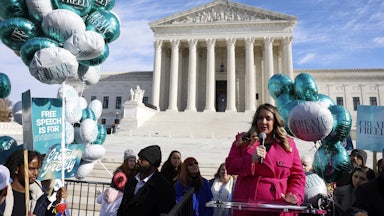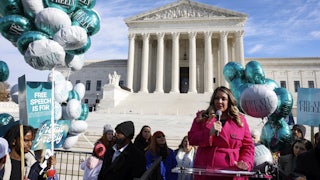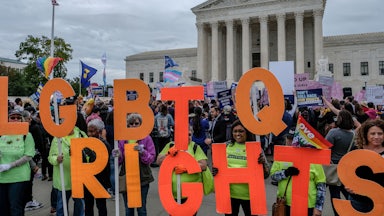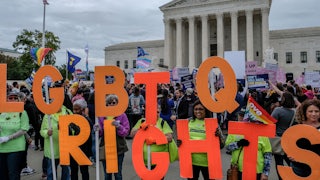“Christ calls us to be ‘wise as serpents and harmless as doves,’” wrote Mike Johnson on a Creationist website in 2017. Johnson, who became speaker of the House in October, was counseling his fellow Christians on how to live in a new and “hostile world,” as he put it, where the Supreme Court had just recently recognized the right of same-sex couples to marry. He positioned himself and fellow believers as members of a persecuted minority, who would need to present themselves carefully if they were going to prevail.
Johnson is no harmless dove or wise serpent. He is a man who has been steadily accruing political and religious power, largely outside the limelight, for years. When he assumed the speakership of the House of Representatives in October, it seemed to be despite or perhaps precisely because he had effectively assumed the guise he once advised fellow Christians to take: a nice guy, one who knows how to make shrewd moves with an air of absolute innocence. Now, even as he stands second in line to the presidency, Johnson hopes to retain the role of the righteously persecuted.
Mike Johnson did not come out nowhere—unless the political workings of the Christian right are in some “nowhere” zone, as can seem the case with much political reporting. The journalist Sarah Posner recently wrote that she first encountered Johnson back in 2007. “At the time, Johnson insisted to me that Christians were the ones facing discrimination,” recalled Posner. He was then an attorney working for Alliance Defending Freedom, the Christian right law project that would go on to successive Supreme Court victories, most notably rolling back abortion rights in the Dobbs decision and undermining LGBTQ rights in the (purported) same-sex wedding website case 303 Creative. Like Johnson himself, ADF has flown relatively below the political radar, even though it openly states that its mission is to use the power of the judiciary to bring about its biblical worldview. This worldview involves outlawing abortion, criminalizing queer sex, and eliminating trans people.
At the time Posner interviewed Johnson, in the 2000s, he was one of the public faces of ADF (then called the Alliance Defense Fund), penning lines on their behalf like, “Experts project that homosexual marriage is the dark harbinger of chaos and sexual anarchy that could doom even the strongest republic.” He insisted that “[r]adical homosexual advocacy groups ... desperate for liberal judges” pose a threat to the “entire democratic system.” For ADF and for Johnson, lesbian, gay, and bisexual people in the United States were not being threatened by the Christian right; rather, lesbian, gay, and bisexual people were the ones threatening Christians. For Christians to defend themselves and to defeat gay people, Johnson proposed passing constitutional amendments that would essentially outlaw same-sex marriage. At the time, this was a popular project, with amendments passing in 11 states in one election in 2004. That came to an eventual end with Obergefell, but by then the notion that rights for LGBTQ people posed an existential threat to American Christians had taken root. It would continue to be ADF’s signature thesis, inverting the oppressor and the oppressed.
It would be comforting to look at this argument, alleging Christians in the U.S. are victims of discrimination and persecution who are owed protection by the state, and see it merely as a ploy, a way of gaming the legal system. But Johnson appears to sincerely believe it. After seven years of the MAGA movement, and opposition to it too often confined to fact-checking and prosecuting a cast of out-of-touch extremists, untalented grifters, and shameless con men, Johnson appears to have scrambled the playbook—because he does seem to really believe in something more than his own self-advancement. “So which is he: an anti-democratic politician and an insurrectionist, or a mild-mannered Christian?” the religion scholar Matthew D. Taylor asked rhetorically, shortly after Johnson was elected speaker. “Part of the problem is that we have come to imagine that a person cannot be both at the same time.”
Kristin Kobes Du Mez is a historian of the Christian right (and a Christian herself). “He is incredibly standard in terms of being a right-wing, white evangelical Christian nationalist,” she remarked to Politico after Johnson’s win. “Freedom for them means freedom to obey God’s law, not freedom to do what you want.” As such, she continued, Johnson’s “commitment is not to democracy.” Rather, “he seems to be saying he’s committed to minority rule, if that’s what it takes to ensure that we stay on the Christian foundation that the founders have set up.”
Five years before he attempted to overturn the 2020 election, Johnson joined the Louisiana House of Representatives without needing a single vote, after no one ran against him for a vacant seat in 2015. At the time of his winning the seat by default, Johnson was also still serving as counsel for Christian right projects, such as Freedom Guard. At Freedom Guard, Johnson won a court case on behalf of the Creationist group he would go on to write for, awarding tax incentives to a “Noah’s Ark” tourist attraction that was an “extension” of the group’s “ministry.” Again, Johnson worked to paint Christians as a victimized group. The resulting victory, said Johnson, set a “precedent” that the “First Amendment does not allow Christian organizations to be treated like second-class citizens merely because of what they believe.”
As a state legislator, one of Johnson’s big moves in 2016 was to pass legislation meant to undermine marriage equality—then nationally protected—in Louisiana. In his attempt to win support for the legislation, according to reporting from John Stanton at The Gambit, Johnson cited what he called “specific examples” of clergy members and religious groups being “prosecuted, fined, [and] punished” for refusing to perform weddings for same-sex couples. As Stanton showed, there have been no such instances of prosecutions, fines, or punishment. How far of a leap is it from fake prosecutions to fake electors? The distance is considerably narrowed if you believe God wills you to go there.
Johnson’s election denialism and his anti-LGBTQ politics emerge from the same ideological commitments. After all, if under democracy white Christians are being “replaced”—by immigrants, by Muslims, by trans kids, by drag queens, by a whole litany of scapegoats—perhaps the only way to save the U.S. and white Christians is to end democracy. Democracy leads to abortions and gay sex. Democracy means that the candidate ordained by God can maybe lose an election.
When Johnson states, as he did on an episode of his podcast (which he recently deleted from his personal website), that he voted to reject the electoral count in the 2020 presidential election, it was because “slates of electors were produced by a clearly unconstitutional process, period.” They were not. But when all that “constitutional” means is “what I believe God orders to be,” who’s to say—that is what Johnson is offering. Of the violence at the Capitol on January 6, which was meant to bolster the action of Johnson and others, Johnson has said, “The violence never changed the plain and straightforward text of the Constitution itself, and our obligation to adhere to it.” That suggests the possibility the rioters and objectors were all following the will of God, and that, for Johnson, the violence wasn’t so far from God’s will after all.
“For Christian Nationalists, this is God’s country,” as Du Mez said. To them, “all authority comes through God,” meaning in turn that “the only legitimate use of that authority is to further God’s plan for this country.” Therefore, “any of their political enemies are illegitimate in a sense, and those enemies’ power is illegitimate, and they need to be stripped of that power.”
The same day that Mike Johnson declared his ascension to the speakership as God raising him up, the House was also holding a hearing on “global religious persecution.” Representative Maxwell Frost, a Democrat from Florida and a Christian, used the hearing to speak to the threat posed by Christian nationalism, which he defined in part as “a form of religious extremism making its way into our policies and undermining our democracy.” He asked one expert witness, in what could be a summary of Johnson’s political accomplishments so far, “Have you noticed a coordinated attempt in America to co-opt the right of religious freedom to try and justify stripping rights away from people?” Frost later warned, “This threat to democracy has made its way to Congress,” a threat that his colleagues had just empowered with the speaker’s gavel.
The verse that follows the one Johnson quoted to Christians in a “hostile world” back in 2015 is a little too apt. “Beware of men,” reads Matthew 10:17, “for they will hand you over to courts and flog you in their synagogues.” It’s a warning about the dangers posed by people in power. Johnson is now undeniably one of them.
This article has been updated.










